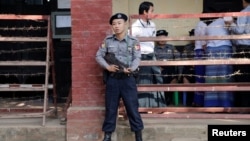Myanmar has launched a crackdown in recent weeks on peaceful critics of the military and the government, arresting satirical performers, activists, a journalist and a prominent filmmaker with liver cancer.
The surge in arrests comes even as officials promise to release “politically related” prisoners and people linked to rebel armed groups following last month's mass pardon of inmates, who were mostly serving time for drug offenses.
For many activists, the pardons, far from being a sign of hope, show that Myanmar’s first civilian leaders in decades remain committed to playing by the same rulebook as their military-backed predecessors.
To win their freedom “those persecuted by the state are forced to rely on the ‘forgiveness’ of this same state,” the Burma Human Rights Network said in a statement late last month.
One of those recently arrested, filmmaker and rights advocate Min Htin Ko Ko Gyi, has been repeatedly denied bail despite fears he could die in custody as he struggles with liver cancer.
He was charged in early April under section 66d - a notorious anti-defamation law that critics say is used to silence dissent - after he posted on Facebook criticizing the military’s dominant role in politics.
He was later charged under section 505a, which bans statements that might induce members of the military to “disregard” their duties. He faces up to four years in prison, but some are worried he might not live through the trial if he is not transferred to a hospital for specialized care.
At a hearing last week at Yangon’s Insein court, he was so weak that he collapsed while sitting on a bench. Officials continued the hearing as his friends and family propped up his head and fanned him while he laid down.
Later, defense lawyer Robert San Aung tried again to convince the judge to grant bail on health grounds.
Min Htin Ko Ko Gyi’s friends helped him to his feet and unbuttoned his shirt to reveal a scar running down the length of his torso from a recent operation on his liver. The judge didn’t react, but promptly dismissed the lawyer’s request for bail.
In a joint letter ahead of the hearing, hundreds of filmmakers and other professionals from around the world wrote that they were “gravely concerned for his health and fear for his life” if he is kept in custody.
Government spokesperson Zaw Htay could not be reached for comment.
Phil Robertson, deputy director for Asia at Human Rights Watch, told VOA that the military, faced with increasing condemnation from abroad for its treatment of the Rohingya and other minorities in various conflicts around the country, “is doubling down on silencing critics at home.”
“Many activists, especially younger activists, are being careful with their social media posts” after the recent spate of arrests, said youth activist Thinzar Shunlei Yi.
But she sees the arrests as a sign that campaigners are doing their jobs properly and “a chance to show the military’s true nature, even though they are saying they support democracy."
Many had hoped that the party of former political prisoner Aung San Suu Kyi, the National League for Democracy (NLD), would use its large parliamentary majority to revoke laws used to stifle free speech when it came to power in 2016.
Instead, says Robertson, her party has found that having laws on the books to silence its own critics “is too tempting for the NLD to resist.”
Zau Jat, an anti-war activist who was pardoned last month after being jailed in December for “defaming” the military during a protest, told VOA the NLD uses oppressive laws to its advantage.
“They want to threaten people who complain about them,” he said.





